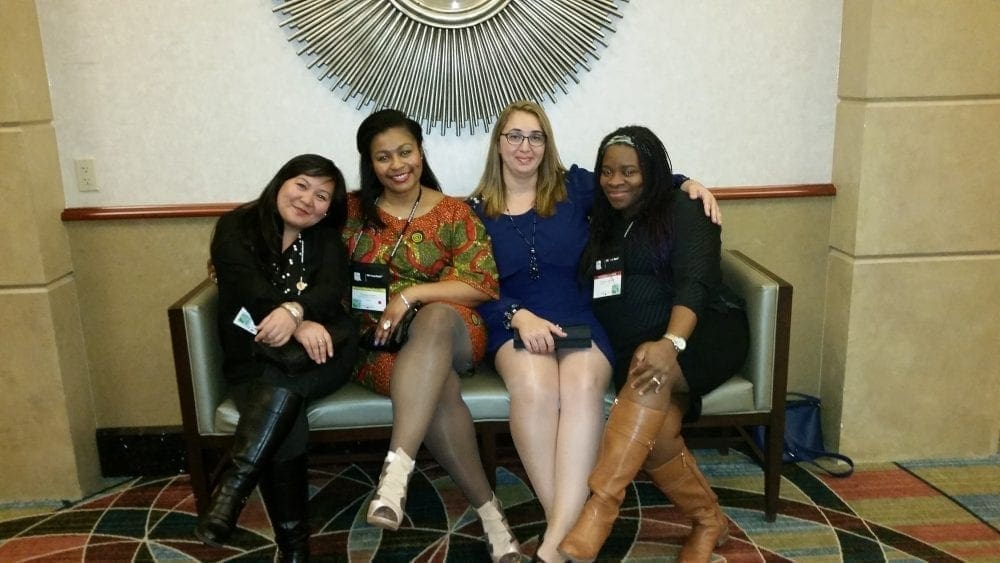Inspired by our Lightning Round presentation, From International Student to International Education Professional at the CBIE Conference in 2015, we are embarking on a four-part blog series to expound on session topics. At the Lightning Round session we were given 3 to 5 minutes each to share our stories as international students and how it helps us in our current roles as international education (IE) professionals (photo above from left to right: Helen Sophia Chua Balderama, Shanda Williams, Gulcan Barclay, and Candace Stewart). We reflected on how those stories enabled us to develop competences relevant to the IE field such as advocacy, intercultural competences and emotional resilience. All three competences are referenced in IE resources such as the NAFSA International Education Professional Competencies and in the Training for International Educators in Canada: A Competency-Based Approach, published in 2015 and in 2008, respectively.
- Gulcan Barclay (International Student Advisor, Camosun College) shares her experiences and makes recommendations about how to choose an international education destination.
- Shanda Williams (Student Programming Coordinator-International, Grenfell Campus, Memorial University of Newfoundland) to discuss how current international students can take full advantage of the opportunities to study within Canadian universities.
- Lisa Brunner (International Student Advisor, International Student Development, University of British Columbia) to discuss the emotional labour involved in cultivating transformation through international education.
- Helen Sophia Chua Balderama (International Partnership Officer, University of Manitoba) shares how international education serves as another mentor and influences her day to day practice as an education professional.
Gulcan Barclay kicks off the series. Stay tuned for the next installments over the coming weeks!
Prospective Students – Think with your mind and heart before starting your international education journey

When I first started my career as an education agent many years ago, I would respond to students’ questions on study destination, future job options, program options, etc. with further questions to help them find their own answers, rather than provide the answers. I hoped this would guide them towards understanding their strengths and think about their likes, needs and future goals. My philosophy in advising is to empower students so that they can make their own decisions, take responsibility for these decisions, and be comfortable with the outcomes. The best we can do is to support students in their thinking as best as we can with our knowledge of international education and experiences in this field.
When I was offered a scholarship to study Business in beautiful Victoria, British Columbia I decided that I would take my own advice and put my mind and heart into my thinking about my own international education journey. Even though tuition scholarships can lighten financial burdens they do not address accommodation, travel, or daily living expenses. I prepared a detailed financial plan, made sure I had a job to return to after my studies, and started building my personal and professional connections in Victoria before my arrival. The decision to study abroad is a very difficult and challenging one that required me to step out of my comfort zone. I had to emotionally prepare myself to accept that I would be homesick, away from my support environment and functioning in a culture that I had only observed from outside.
It is very important to consider the following while choosing a study destination:
- Program options offered – Make sure you are interested in the subject you will be studying. Without interest even the “best” school cannot help you with your educational goals. Education systems are different in each country. Check the program contents rather than the program name while evaluating your program of choice. Prefer programs that offer internship options. This will enhance your in-class learning and help you decide for your future career without waiting to complete your studies.
- International student services – Living in a country is very different than visiting it as a tourist. Look for the availability of advising and counselling services for international students along with programs that help you connect with the city you live in and with your peers.
- Financial considerations – Financing your studies is a significant part of planning an education abroad. Research currency information, scholarship and funding support for international students, exchange student agreements, and work permit regulations in your destination country. Off campus work regulations might assist you with your daily expenses.
- Environment – Pick a city that matches your lifestyle; and look for places that are culturally diverse. Environmental, societal and cultural characteristics of your destination city will contribute extensively to your international experience. Most of your learning will occur outside the classroom. You will make the most of it if you choose a city that you will enjoy living in.
In a world where the skills and competencies developed through international education experiences are highly sought after in careers, these considerations helped me to be prepared for one of the most transformative decisions and experiences of my life.
Gulcan Barclay is an International Student Advisor working at Camosun College in Victoria, British Columbia. Originally from Turkey, Gulcan has lived and worked in Canada for the past 11 years; and holds a Master of Education in Educational Leadership degree from University of Victoria.



Comments are closed.